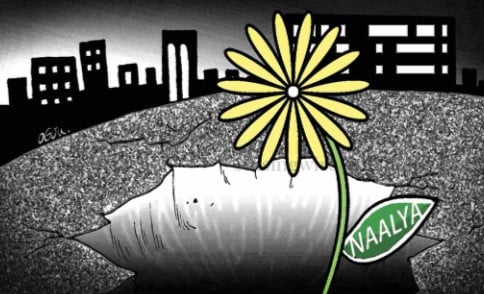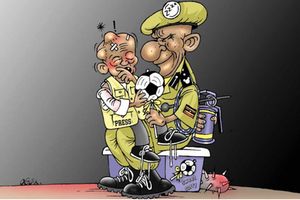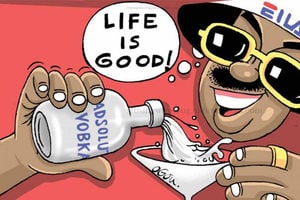
My friend argues that 15 years is the point that calls for reflection
OUT OF TIME: Time is the currency. One day you are 24, another day you’re in the 40s and soon you hit a 69. It’s just these numbers moving so fast, that we tend to think they’re not even moving. Again, there could be more intentionality on the things we do.
Our time on earth is infinitesimally short. We are here today, and we are gone tomorrow. It’s not so back when I was the child of the times. It’s not so back when I was the teenager of the times. It won’t be so far away when I am the old of the times.
I recently tasked one of my friends, the awesome Pippa. I told her that there are many retirees I come across in the community. They are underserved. Who is seeking them out? Which companies are targeting them? Okay, there’s those that sell them fear, so they end up in rushed investments. But who is really trying to get the most out of them in these years?
I think of the retired doctors in my community. They still have lots to offer. I think of retired mathematicians, and teachers. There should be a space where they meet, where they catch up and continue to contribute to the transformation of their country. But as a society, we don’t seem to believe in these national memories, in the power that comes from our collective past. In the past, most Kindergartens were run by retirees. They were no longer seeking money; they were now seeking a life. And those small contributions by the retirees of those times, they made so much sense.
Again, the problem we think is that we won’t soon be part of the segment. We often think retirement is a million years away. Humans are terrible at conceptualizing time. Ugandans are even worse as a type of humans. Time is the currency. One day you are 24, another day you’re in the 40s and soon you hit a 69. It’s just these numbers moving so fast, that we tend to think they’re not even moving. Again, there could be more intentionality on the things we do. We could do with a little more thoughtfulness.
Why? Because within a decade a lot changes. Many people die. Today you speak at someone’s funeral, in the next 10 years, there’s a high probability that someone will speak at your funeral. It’s true that final certainty gets closer by the day. It’s the only truth that we must do something about. The fact that this thing ends, that’s the starting point, that’s the point of recollection, it’s the point of re-emergence.
What then shall woman do with this truth? Shall she go into a degeneration? If there’s no escape, should one then sell out to insanity? If nothing ever counts, should we resign to this fate?
The question of existence has bothered millions before us. From Albert Camus to Franz Kafka to Jean Paul Satre to even Nietzsche. Perhaps Nietzsche emerged victorious from this race. He argued that let’s forget it all, let’s focus on one big virtue, that is courage.
Let’s seek one end, the will to power. And let’s realize that man is just a path to the Übermensch, the over man, something that surpasses man. I am sold to that. I am sold to a progressive improvement of man.
It’s the message of the Olympics. That man can be overcome. That out of man can come a superior version. It should be the obsession of our lives. But then, people say, the bills must be paid.
The X wars must be held. We must decide whether to hang around in the Public Square or in the Agora. Nietzsche would say, all that is nonsense. All that really matters is the courage to create the Übermensch.
I met another friend. He goes by the name ‘Lumpen’. But lumpen he’s not. I asked him what really happened to Uganda post 2001? Because I remember that time like yesterday.
It was a promise of a glorious future. I remember so vividly the Kampala culture. I remember the battle of the creatives. I remember having to choose between Santa Anzo and Sylvia Owori. It was so good, there was even a House of Kaine. There was an East African Television. I remember George Okudi working us, with Wipolo. Jose Chameleone was breathing the language of the gods. I asked my friend; what happened? Why didn’t we cross the bridge?
My friend argues that 15 years is the point that calls for reflection. When Lee Kuan Yew in Singapore made such a time, he went off to reflect. He did what the Baganda call; ‘okweyubuula.’ He knew it was time for a renewal, a revival. The Lee Kuan Yew that returned was different. The cabinet was totally different, the philosophy was different. My friend argues that Uganda didn’t have that moment of revival.
And perhaps, what we most need urgently in the country is some revival. I told my brother that Uganda has two paths to recovery, either internal reform or revolution. He says the chance for internal reform is gone. It’s only revolution.
But people, I do argue, any revolution that’s not cultural is not worth the movement. It all starts with culture. If you form the right culture, all else becomes automatic. Why hasn’t this culture produced a Foucault? A Derrida? A Spivak? A BB King? A Tina Turner? May we answer that question in our lifetime! What we seek is a revolution of the soul, spirit, mind and body. More will, more feeling, more deeds, and less illusions.
Can the Bazukuffu of Kawempe sound the trumpet?
X: @ortegatalks




